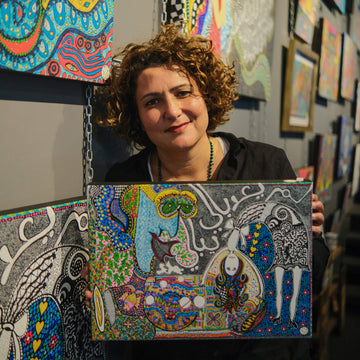Myanmar formally known as Burma is in South East Asia, a country which borders Bangladesh, India, China, Laos, Thailand, and the Bay of Bengal. It is a well-known region for growing tea but not for coffee, although they have been growing coffee as a cash crop since 1885, when it was introduced by British Colonists. The remote village we purchase our green coffee from is found in the Southern Shan State, called Ga Naing Yar. It is a peaceful, very isolated rural village well off the tourist tracks, a single rocky road mostly travelled on foot is the only access in or out, one lone electrical cable strung up on wobbly poles brings in power and it is nestled in the most idealistic little mountain valley surrounded by the beautiful fertile farmland.

Isolated from the shocking internal conflicts and ongoing Rohingya violence, these people are peaceful, very devote Buddhists with very little news or awareness of their own countries political issues let alone the rest of the world. The women work alongside the men, and from all the country’s we are lucky enough to travel to when we source green beans, these people were by far the calmest, quietest community, with their demure speech and manner, they worked together and parented their children and it made a huge impression on us.
When we set up our tents to camp with them, close to the village Monastery and beside the flat open village space that each year becomes the villages coffee drying station, children came to watch quietly and while the adults were interested they also kept a distance. When we wandered through their village, those brave enough would come out to invite us in for tea, where we would sit on the floor and there was lots of polite smiling at each other but no way to communicate. While it was quiet, it was very industrious and everyone was doing something, threshing soybeans, cooking food, collecting water, carrying something, feeding animals who were stored in the house, even the very old grandmothers and young children.

Ga Naing Yar is a typical example of small holder farmers who grow the most spectacular specialty coffee; they plant coffee trees in amongst other crops (they grow a lot of tea here) who then pick their ripe cherries and bring it in to a centralised weight station where a village elected record keeper will weigh the cherry for each farmer and record the daily kilo’s. Then as a village they collectively process and sell their annual coffee crop, then share out each farmers income.
We first started purchasing from Ga Naing Yar after being invited in 2016 by the Coffee Quality Institute, to join a buying trip. We were blown away by the quality of the coffee at a cupping that was held in country and managed to purchase the total crop of the 2016 harvest from this community, which was a total of only 14 sacks. We quickly committed to purchase the next year’s crop as well if they could guarantee the same amazing quality, knowing this would allow the community to plan on how they want to spend that money but also act as an incentive when the farmers were considering what crops to plant and how to balance their cash flow. And so, our relationship began.

The price we agreed upon was three times, the price these same farmers had been receiving when they tried to sell the coffee at local market, and the social premium we paid meant the village was able to meet and decide what to spend their money on, whether to improve their access road or bring in more power lines or maybe buy chickens so they could have more diverse food security. Giving them the financial security to plan for their future opens so many doors, giving them a chance at a higher standard of living and giving us a higher quality coffee year on year. This is what it means to the farmers, when you our customers actually support local roasters and buy these lovely direct trade coffees – we can buy more, they grow more, the quality just keeps improving as the knowledge is shared and travels in both directions. It’s a lovely win-win situation.
This village formed a coffee co-operative that is a core representative of the 51 families that form the entire community. There is a tangible flow on effect from the success of this group of farmers as the community learns of the benefits of being a part of this community. They are seeing improved techniques being shared with the farmers so they can also earn more money from their coffee (and neighbouring communities are seeing the increased money coming into the community and want to adopt the new farming practices). Before the farmers, often the women, grew their coffee near their houses and used it as a cash group, taking their coffee to the local weekly market and selling it as, what we call, C grade coffee (commodity grade). They would individually pick, process and travel to markets earning a third of what they are achieving now.

They have had assistance to learn how to build raised drying beds for their natural sun-dried coffee, and this alone is responsible for an incredible improvement in the cupping score of the coffee. When we arrived, they were bringing out the bamboo poles and posts that they used the last year, that had carefully been dismantled and stored to re-use for this year’s drying season. This was knowledge shared from the same techniques used in Africa and is called raised African drying beds. It means the ripe cherries are dried and aerated / turned by hand so that they uniformly dry on the beds, a processing method called Natural or sun-dried coffee.
Together as a village, the community also pool their money to hire transportation to the mill, and processing stations which saves them money. The flow on effect from the roasters and the farmers actually meeting is incredibly beneficial in both directions.
A high light for us the next year, was also taking with us to Myanmar, Dinesh who is one of our senior team members. He comes from Nepal, a country that sits along the same latitude as Myanmar, and many of the native trees and crops that grew in this village, he was familiar with, as the same trees and crops grow in Nepal. Dinesh is a senior barista, he has been the head of our RAW espresso bar, he has been the head of training and is a certified AST barista trainer. He is now our Roastery Manager, and his future with us is very exciting. It was amazing for us, to travel to Myanmar, take Dinesh with us to show them a fellow South East Asian coffee star. We took with us my daughter to photograph and record our experience and some freshly roasted coffee from of their actual village, that we brewed with them so they could, for the first time ever, actually drink their coffee.

For me it was very emotional, on many levels, as these people sat silently on the ground floor of the Monastery which had been swept and tidied up for the event, I think every single person from the village was there. They focused on Dinesh as he set up his little brewing station, with a hand grinder and hot water kettles that had been boiled on a fire. We had a translator with us, who very quietly spoke and explained the process to the audience, and nobody made a sound, but many took notes. Small glasses were then rinsed and passed around, with the women first passing the cups of brewed coffee to the most senior men first, before they tried the coffee themselves, and then the younger men and women – the future farmers. To watch their faces and try to understand what they were thinking, and to answer questions about our facility in Dubai, and who our customers were, and what our customers thought of their coffee was very moving. We also took some images of the roastery here in Dubai and of the rest of the team here at RAW, they were intrigued to see how multicultural we are as a team, and that we had young women from Kenya, Uganda and the Philippines also working with us. We showed them our roasters, our logo and branding, and we gifted them a hand grinder and some of our portable French presses so that in the future, at special occasions they could drink their own coffee. It’s important as your roasters, that we share our stories and our farmers stories from origin, to give them a voice and for you to feel a connection to these amazing farmers to produce this incredible crop for us.

If you haven’t tried our Myanmar Ga Naing Yar coffee, please consider it! You will taste red berries, prunes, sweet dark chocolate, low acidity and a nice long aftertaste. When we originally cupped this coffee, we also wrote down some positive distinctive, and very unusual notes of Sandalwood and Tamarind!






